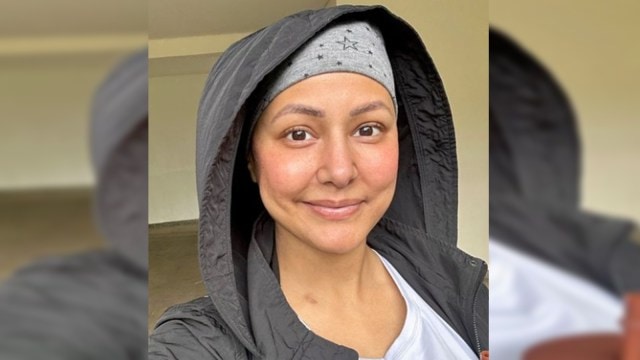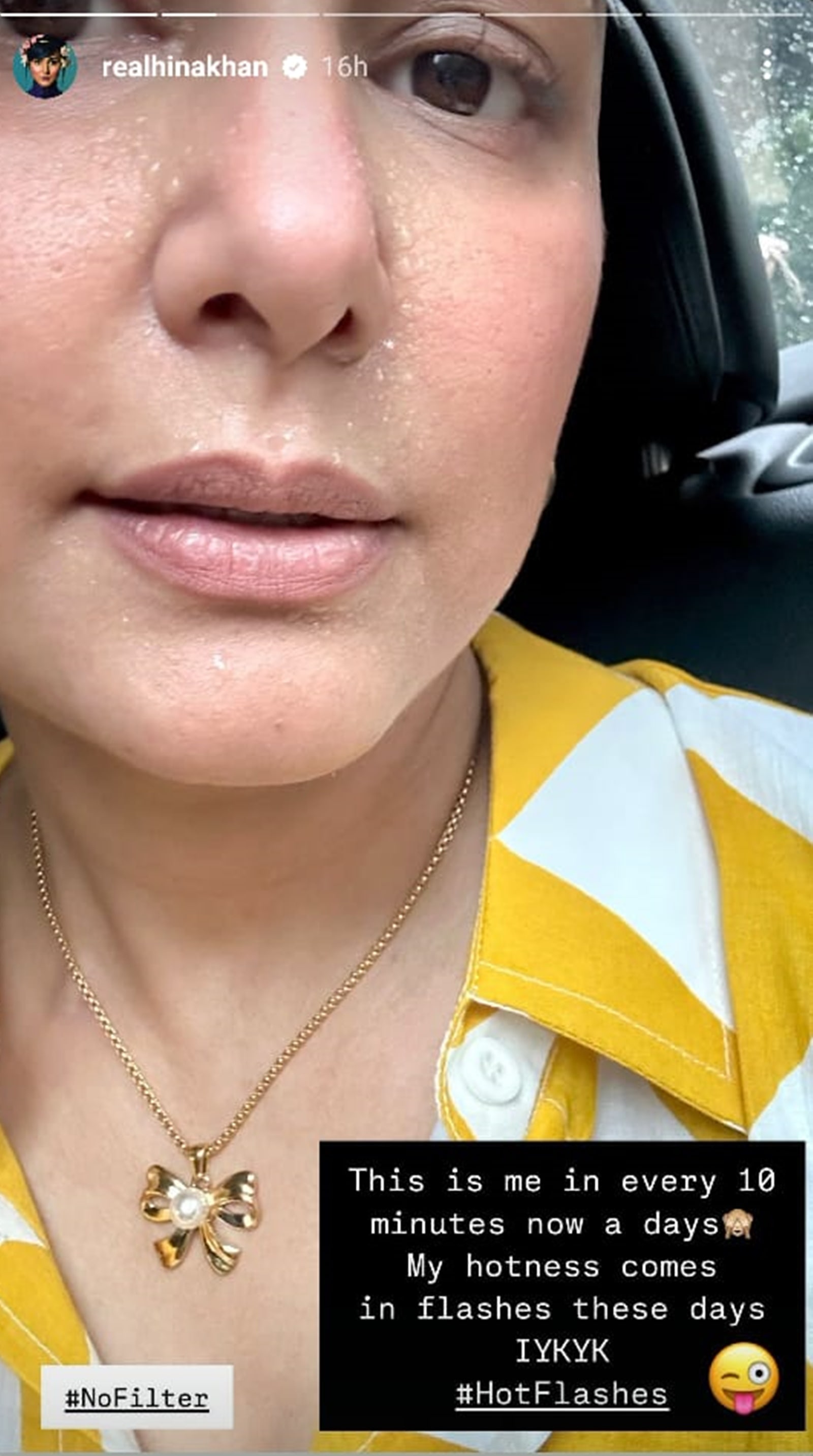📣 For more lifestyle news, click here to join our WhatsApp Channel and also follow us on Instagram
Following mucositis, Hina Khan reveals another side effect of cancer treatment: ‘My hotness comes in flashes’
Last week, Hina Khan told fans that she has mucositis, a painful side effect of cancer therapy that causes inflammation and ulceration in the digestive tract.
 Hina Khan shares her many problems and sideeffects of chemotherapy. (Photo: Hina Khan/Instagram)
Hina Khan shares her many problems and sideeffects of chemotherapy. (Photo: Hina Khan/Instagram)Hina Khan, who is currently undergoing treatment for stage 3 breast cancer, has been constantly updating her fans about the side effects she is facing as part of her chemotherapy.
Last week, the actor told her fans that she has mucositis, a painful side effect of cancer therapy that causes inflammation and ulceration in the digestive tract.
However, in stories shared yesterday, she mentioned that her mucositis has improved. “My mucositis is much better…,” she wrote.
But she is now experiencing hot flashes “every 10 minutes,” a common but often distressing side effect associated with cancer treatments such as chemotherapy, radiation, or hormone therapy. These symptoms can disrupt daily life, making it challenging to maintain normal routines.
 Hina Khan has been constantly updating her fans about her treatment (Source: Instagram/Hina Khan)
Hina Khan has been constantly updating her fans about her treatment (Source: Instagram/Hina Khan)
What causes hot flashes in cancer patients undergoing treatment?
Dr Shiveta Razdan, consultant, Breast Oncology, Amrita Hospital, Faridabad, tells indianexpress.com, “Chemotherapy agents are primarily used in advanced cancer stages, such as stage 3 or stage 4 breast cancer, and often cause significant side effects because they affect the entire body. These drugs target rapidly dividing cells, including both cancerous and normal cells. Besides tumour cells, fast-growing normal tissues like blood cells, skin, the mucous membranes of the digestive system, and reproductive organs are also affected.”
Dr Kumardeep Dutta Choudhury, director, Medical Oncology, Max Hospital, Shalimar Bagh, adds, “Hot flashes are a common side effect of many cancer treatments, especially those that affect hormone levels, such as chemotherapy and radiation therapy.”
He explains that these treatments can disrupt the body’s natural hormone balance, leading to symptoms like:
Vasodilation: Blood vessels widen, causing a sudden rush of blood to the skin’s surface.
Sweating: The body’s response to the increased blood flow.
Flushing: A feeling of warmth or redness in the face, neck, and chest.
Side effects can vary significantly from patient to patient, with some experiencing severe reactions while others have minimal or none, informs Dr Razdan.
Specific treatments or lifestyle changes that can help manage hot flushes and other side effects
Dr Razdan stresses, “Patients undergoing chemotherapy should strictly follow their doctor’s advice and avoid taking any over-the-counter medications without consultation. They should maintain a healthy diet, ideally under the guidance of a dietitian, and engage in light exercise, such as walking or yoga, based on their physical condition. Meditation can also be beneficial. While there are no specific treatments for hot flashes, adopting a healthy lifestyle can help reduce these side effects.”
 Hina has been experiencing hot flashes (Source: Instagram/Hina Khan)
Hina has been experiencing hot flashes (Source: Instagram/Hina Khan)
Can managing one side effect like mucositis inevitably trigger or worsen another, such as hot flushes?
Dr Chudhury states, “Determine which symptoms are most bothersome and focus on managing those first. Don’t forget to discuss your symptoms with your healthcare provider to develop a comprehensive management plan that addresses all your needs. Be prepared to adjust your treatment plan as your symptoms change.”
Potential long-term effects of experiencing frequent hot flushes
Some side effects of chemotherapy will disappear once the treatment ends, Dr Razdan notes, while others may persist for a longer period but usually improve over time. “For example, hot flashes occur due to the effects of chemotherapy on the ovaries, which may become less functional or stop functioning entirely in some patients. These hot flashes can last a long time, but they typically improve gradually, although there is no specific timeframe for when this will happen. Overall, most side effects tend to diminish over time.”
| DISCLAIMER: This article is based on information from the public domain and/or the experts we spoke to. Always consult your health practitioner before starting any routine. |
📣 For more lifestyle news, click here to join our WhatsApp Channel and also follow us on Instagram





- 01
- 02
- 03
- 04
- 05






















